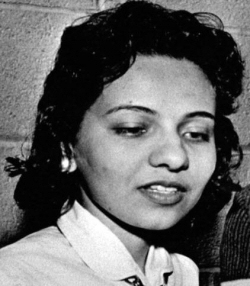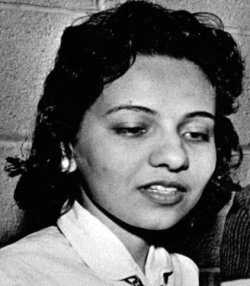

Through her involvement with the Student Nonviolent Coordinating Committee (SNCC) and the Southern Christian Leadership Conference (SCLC), Diane Nash worked closely with Marin Luther King. In 1962 King nominated Nash for a civil rights award sponsored by the New York branch of the NAACP to acknowledge her exemplary role in the student sit-ins. Born in 1938, in Chicago, Illinois, Nash left Chicago to attend Howard University in Washington, D.C., but transferred a year later to Fisk University in Nashville, Tennessee, where she majored in English. In Nashville, Nash experienced the full effect of the Jim Crow system for the first time.
In 1959 she began attending nonviolence workshops given by James Lawson. Initially a skeptic of nonviolent tactics, Nash began to understand their effectiveness and marveled at the willingness of people to risk their lives for the sake of others. She had the opportunity to practice nonviolent direct action after the Student Central Committee in Nashville organized sit-ins in local department stores. Their sit-ins occurred in conjunction with the wave of sit-ins across the South initiated in Greensboro, North Carolina, on 1 February 1960.
In 1960 Nash attended the founding meeting of SNCC in Raleigh, North Carolina. In 1961 SNCC began supporting 10 students in Rock Hill, South Carolina, who were involved in protest activities and refused to post bail after being arrested. Shortly after arriving in Rock Hill, Nash and three other activists were also jailed for requesting service at a segregated lunch counter. For Nash, ‘‘jail without bail’’ gave protesters the ‘‘opportunity to reach the community and society with a great moral appeal and thus bring about basic changes in people and in society.’’
During the spring of 1961 Nash played a crucial role in sustaining Freedom Rides initiated by the Congress of Racial Equality (CORE). From her base in Nashville, she coordinated student efforts to continue the rides into Mississippi and served as a liaison between the press and the United States Department of Justice. Tensions developed between King and SNCC members, including Nash, when King refused to participate in the Freedom Rides himself.
After her leadership role in the Freedom Rides, Nash became head of SNCC’s direct action campaigns during the summer of 1961. That same year she married James Bevel, a fellow civil rights activist. The two moved to Jackson, Mississippi, where Nash was later convicted of contributing to the delinquency of minors for teaching them nonviolent tactics. Given a choice between paying a fine and jail time, Nash opted to serve her sentence despite being pregnant.
The judge suspended her sentence rather than face the possibility of negative publicity for sending a pregnant woman to jail. In 1962 she joined Bevel at SCLC as a field staff organizer. She and Bevel made important contributions to the Birmingham Campaign, March on Washington for Jobs and Freedom, and the Selma Campaign.
From the late 1960s onward, Nash taught in Chicago public schools and continued her activism organizing tenants, welfare support, and housing advocates.
